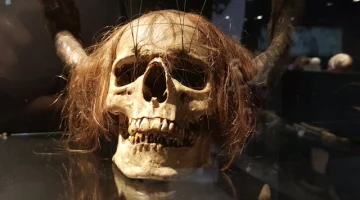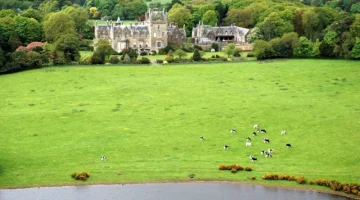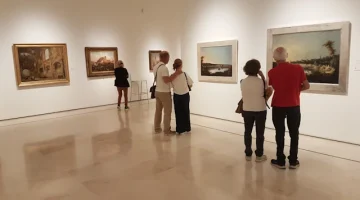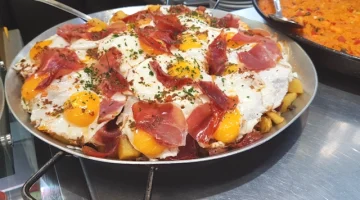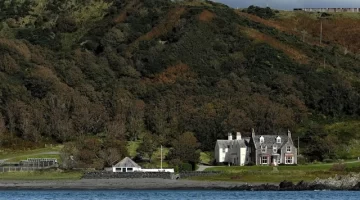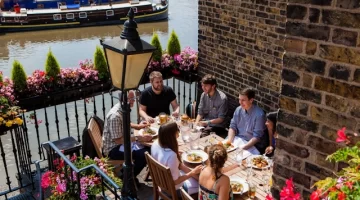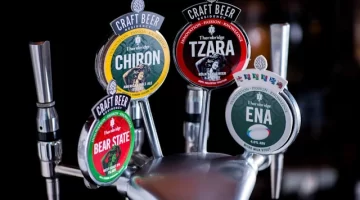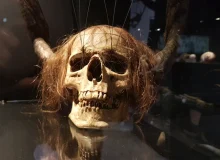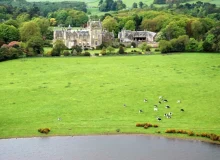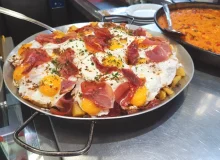I Hate Cheerful People
By Mike Gerrard
‘I hate cheerful people,’ said the Jamaican woman sitting next to me on the plane. I don’t know what she did for a living, but she could have got a job as a double for Whoopi Goldberg any day of the week, and her comic timing was just as impressive too.
I could only laugh and agree with her, as we were being force fed an inane information video whose presenter was irritatingly bubbly: ‘Hey! You’re going to have a great time in Jamaica… Hey! I think we might be in for a surprise round this corner… Hey! But seriously, don’t let the sun spoil your fun, remember to cover up.’ It made you want to wave your boarding card at her and yell, ‘Hey! This is my seat number not my IQ.’
Most people on the plane were heading for the all-inclusive hotel resorts of Montego Bay and Negril. Most people going to Jamaica do. Now all-inclusives offer a terrific deal, but so relentlessly are they associated with the image of Jamaica that it’s easy to forget there’s a whole other country out there too. A country where people are cheerful without being paid to be.

Whoopi was spending three weeks with relatives, and I was going with my partner to the south-west coast, to the small but perfectly-named resort of Treasure Beach. The Lonely Planet guide to Jamaica describes it as ‘a gem for travelers in search of the off-beat. You won’t find a more authentically charming and relaxing place in Jamaica.’
It’s a two-hour transfer from the airport at Montego Bay, or at least it is the way the Jamaicans drive. As we roared through hill villages scattering chickens and narrowly missing little boys on bicycles, I tried not to remember something else I’d just read in the guidebook: that Jamaica has the third worst record in the world for deaths on the roads. I looked instead at the lush greenery, the jerk chicken stands and signs with names like ‘Cheap Charlie’s’ and ‘Rasta Pasta’.

‘Do you take many people to Treasure Beach?’ I asked the driver, in a rare moment when he wasn’t actually trying to add to the death statistics. ‘No,’ he said. ‘I ain’t never been there before. I know where it is, I live nearby, but I never took anyone from the airport.’ I only allow myself to feel smug once a year, and this was it.
But why don’t more people know about it? Guidebooks use words like ‘gem’ and ‘jewel’ to describe both the village and its beach, and all agree with Jamaica: A Visitor’s Guide that the local people ‘are among the friendliest in all of Jamaica.’ So if your idea of Jamaica is that it’s full of hassles, higglers and hustlers, you’ve been going to the wrong part of the island. Vendors cluster round the all-inclusives, trying to get their slice of the action from which they’re all excluded, and can be as tenacious and as tiring as mosquitoes should you step outside the safety net of your resort. Don’t blame them. Jamaica’s a poor country, with no social security, and you’re rich and have money to spend.
In two weeks in Treasure Beach we met only one vendor with his bagful of carvings and jewellery, a Rastaman who was more a playful puppy than a persistent mosquito. ‘I am the mobile store,’ he boomed, the first time we met him. ‘The more you smile the less you pay.’ But if you didn’t want to buy, you could still stop and pass the time of day. ‘For a while,’ he told us, ‘we got guys selling stuff coming down from Negril and Mo’ Bay, ‘cos it was too busy up there, and they started to hassle the folks in Treasure Beach. But the police chased them away, so you don’t get none of that now. Only me,’ he beamed, ‘but I live here, man.’
Ted lived there too, a good-looking and amiable young fisherman who’d offered us a trip in his boat, down the coast to Alligator Pond where the Little Ochie Pub is one of the best fresh fish eating places on the south coast. It sounded good, $60 for the day, except my partner’s the worst sailor in the world and, as she observed, there’s no fun in eating a terrific meal if you think you’re going to lose it all again on the journey back. We met Ted many times in the street, Treasure Beach being a one-street village, and not once did he ask if we’d thought any more about the boat trip. ‘How you doin?’ he’d say, and cycle or walk beside you a way, being sociable.

I mentioned to Ted one day that I’d visited Kingston, on a previous trip to Jamaica. ‘Oh man,’ he said, ‘I’ve only been there once. I’d only go again if it was compulsory. It’s full of crazy guys. Guys taking coke. It’s dangerous. They’ll kill you, man. Treasure Beach is safe. You can walk late at night and perfectly safe. No-one harm you, no-one hassle you.’
‘How you doin’?’ we would hear again and again. From Dougie, the dignified barman at Jake’s Hotel, who conjured up the rum punch with the best punch in town. From Jason Henzell, who owned Jake’s Hotel, with its handful of rooms overlooking the beach, each designed differently by Jason’s artist mother, Sally, showing influences from Mexican to Moslem. Little wonder it’s popular with artists and writers.
‘How you doin’?’ from Chris, Jason’s chef, whose curried goat must have been seasoned with all the spices under the sun: smelling it cooking in the afternoon made you put your nose in the air and go, ‘Mmmm-mmmm!’ Jamaican food is one of the island’s delights. A breakfast dish of mango, pineapple, papaya and passion fruit looks like sunshine on a plate, while a chef like Chris can transform an already tasty dish such as ackee and saltfish into a dream.

‘How you doin’?’ from Sean, the quietly-spoken barman at the Jake’s Hotel, who told me his dreams of a place of his own, back in Westmoreland where he was from. And ‘How you doin?’ from the guy in charge of the hotel’s two swimming pools, keeping them pristine clean. We were there in what is bizarrely known as the off season: late August, when the Jamaicans have already taken their summer holiday and the rest of the world waits for winter before going to the Caribbean. Let them, I say, as some days we could have had a swimming pool each, though we chose to swim together and use the Jacuzzi in the pool below our balcony, as the temperature hit the 90-degree mark and we reflected on the fact that Treasure Beach is the driest corner of the island.
In the evening we would take a walk down the beach to Calabash Bay, past the Fishing Cooperative outside which the boats were bobbing, or hauled up on the sand. Lobster cages lay around, and in the trees that lined the beach the frigate birds with their trailing tails had started to roost. People were lazily swimming, splashing round between the boats. On the shoreline an elderly couple sat on two upturned boxes, watching the children play in the water. Beyond them the sun was slowly setting.
From a bar came the sound, not of reggae but of Hank Williams. Today I passed you on the street, and my heart fell at your feet… His direct lyrics obviously spoke to people here, as we would hear his songs again and again: country music’s Bob Marley, perhaps. Tiny crabs skittered across the sand like ghosts before zipping down one of the hundreds of holes. They were so light and slight, as if created from filigree, and moved so fast you felt they ought to take off into the air, but instead they would suddenly disappear down their own little hole in the ground. Over the sea the silhouette of a pelican was flapping by, till it veered off and dived down, plucking supper from the waves. They obviously stay up later than the frigate birds.
Round the corner away from the crowds, in a tiny bay, a woman was teaching her little girl how to swim. The three-year-old pickney was laughing and splashing her mother, who smiled a greeting at us as we passed. Just beyond a tree trunk lay on the beach, an improvised sunset view, and we sat as the sun was falling now to the horizon. It was doing its impression of an orange, one of the best in its repertoire, about to sink into a milky-blue sea. Hank Williams was distantly audible, behind the shrieks and splashes of the girl and her mother, having as good a time as you could have in your life.
As the sun kissed the sea a fishing boat sailed by, one silhouette in the stern, and the orange line connecting sun to shore was ripped into ripples, which slowly reformed as the boat putted along the coast, but the sun then bobbed below the waves and another day was done. In the trees behind the beach even the pelicans were now flying in to roost. The woman dried her daughter off in a towel and they headed into the untidy cluster of houses behind Calabash Bay. Hey good lookin’, what you got cookin’? I guess it was time to eat. Not even the most cheerful of people could have spoilt an evening like this.





